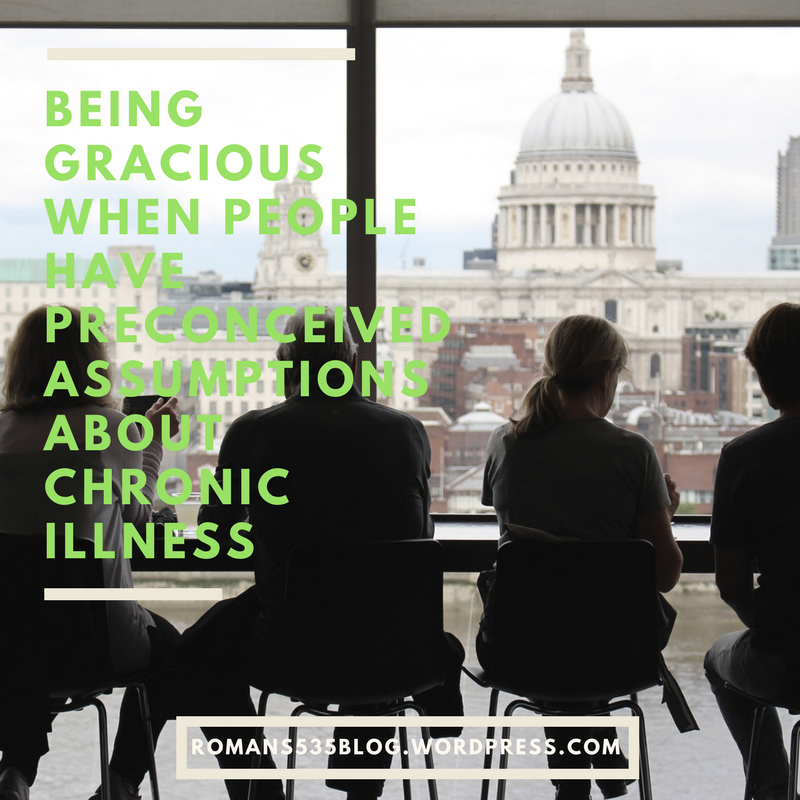“I wish I could tell people I have cancer,” he said. “It would just be so much… simpler. It’s something clear and obvious that most people can understand, as opposed to when I tell them that my liver is overloaded, my spleen, gallbladder, and pancreas are inflamed, and that my body just needs a whole lot more fuel. When I say that, they look at me and blink and say ‘…So, you don’t feel well?’. No, I don’t feel well! But, it’s a lot more than that…”.
Now, neither the man I was talking to–nor I–are trying to compare our various chronic illnesses to cancer, and am by no means taking light the suffering that cancer patients face, but the thing is, so few people understand chronic illness and it’s sufferers.

Everyone has had some kind of experience with sickness. After all, we’re humans, living with humans, on earth. It’s inevitable! (Won’t Heaven be amazing?!) The thing is, not everyone has the same experiences. Everyone has some benchmarker in their mind that they connect sickness (and all its aspects) with. Including chronic illnesses and the like. However, not all of those ‘benchmarkers’ are accurate…
For example, when I say that I have Multiple Chemical Sensitivity (MCS), and then try to explain it, people tend to latch on to certain chemical products. Maybe they realize that perfume makes me sick, but they don’t realize that most shampoo does as well. Or cleaners. Or clothes. Or pillows. Or plastic.
Or when I say that I have food sensitivities/leaky gut, for example. One person was very concerned that their having eaten a peanut butter sandwich would bother me. While I am so thankful for their awareness, that isn’t exactly the situation I’m in. Another thing with food sensitivities is that people often hold on to that one symptom, and forget the rest. Which is understandable, as food allergies or problems are much more common and easy to understand than any of my other symptoms, but the truth is that it is the least of my concerns. 🙂 Yes, it affects my life in a big way, but things like brain fog, anxiety, MCS, or mold affect me a whole lot more. Have you ever experienced something like this from people around you? No? Yes?
I’m guessing you have. Which leads to the question: how do we respond graciously to people’s preconceived assumptions about chronic illness and its symptoms?
First of all, we need to realize that the people who have them are not at some sort of fault. Yes, each situation is different, and people around us can choose to ask questions or do a quick Google search to understand things better, but that isn’t an obligation of theirs. Before I got sick, I made the same mistaken assumptions that people make about me now. The thing is, while people may be mistaken or may be making assumptions, they are at least trying. Often, they are trying to help us in some way (be it helpful or harmful in reality).
When this sort of thing happens, we have a few options. Here are my suggestions of ways to react graciously from my own experience.
If this is the first time you’re meeting the person, and you are not likely to see them again, just smile and nod. It’s probably not going to be the best time for either of you to try and clear things up, and it won’t matter in the long run.
On the other hand, if it is someone you anticipate being around quite frequently in your everyday life, it is wise to let them know early on if they get some of the facts mixed up. Instead of waiting until they know you better and you deem it finally ‘safe’ to tell them about your restrictions (by which time you will have had to suffer the physical consequences of them making unwittingly big mistakes about your sickness that make things worse), let them know now. That way, they won’t feel guilty or confused later.
Of course, always try to be polite, kind, and gracious. If you have tried to explain your food sensitivities to your friend several times, but they still aren’t getting it, and don’t have to feed you at any time, then just let it go. 🙂 The best key to being gracious though, is prayer. Pray that people would be understanding and accommodating and that you would know the best way and time to explain things.
One last thought is to choose a wise time to share those things. In front of an entire group may not be the best option, or when people are in the middle of something, or when there isn’t plenty of time to fully cover all the bases. Sometimes half-told pictures are more harmful than good.
